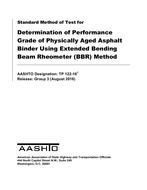Description
This test method covers the determination of the low-temperature performance grade (i.e., minimum design pavement temperature) of asphalt binders by means of a bending beam rheometer after going through a physical aging (physical hardening) process. It is applicable to material having a flexural stiffness value from 20 MPa to 1 GPa (creep compliance values in the range of 50 nPa-1 to 1 nPa-1) and can be used with material aged using T 240 (RTFO) or R 28 (PAV) or with recovered asphalt binder. The test apparatus is designed for testing within the temperature range from -36 to 0°C.
The bending beam rheometer method used in T 313 conditions samples for 1 h and tests at a temperature 10°C warmer than the low-temperature performance grade to determine if the asphalt binder passes the low-temperature requirement. This standard requires testing at two temperatures, to determine by extrapolation a limiting temperature for each of the three conditioning times and two conditioning temperatures.
Low-temperature physical aging of asphalt varies as a function of temperature and time. This standard conditions at 10°C and 20°C warmer than the low-temperature performance grade for periods of 1 h, 24 h, and 72 h to simulate the effect of extended conditioning at two different cold temperatures.
Test results are not valid for beams of asphalt binder that deflect more than 4 mm or less than 0.08 mm when tested in accordance with this method.
Product Details
- Published:
- 2016
- Number of Pages:
- 9
- File Size:
- 1 file , 1.7 MB
- Product Code(s):
- TP122-16-UL, TP122-16-UL, TP122-16-UL
